CHANGE

THE PLOT
Started off unsatisfactorily.
…No, wait. That would be a serious understatement – quite frankly, it actually made me lose faith in the whole JDrama enterprise. I thought it’d be another one of those peachy,preachy dramas about sunshine and rainbows, the importance of being earnest and the inherent (if dormant) good that is in everybody. Not that I mind them particularly. Quite contrarily, I rather love them for their reaffirmation of wholesome human values – they’re…refreshing. But this was a drama presumably about politics, for godssakes. And the torrid, filthy institution that it is. And they just had to start off with an episode like:
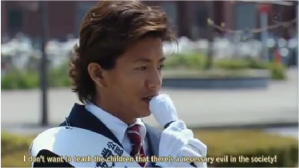
(“I don’t want to teach the children there’s a necessary evil in the society!”)
Yeah, I know. Big words. No wait, GARGANTUAN words.
Not even “no evil” but no necessary evil in society?! So it’s a world that’s not even sloppily dichotomised into straightforward Black and White terms but quite simply, shorn of all evil.
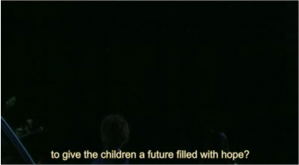
(Of course, they are actually, star-watching. You possibly can’t see that because of the lousy screen-cap quality. But you probably know that already…when and where else do you have cheesy conversations about lighting the candles of hope in the lives of young children?)
Later in the series, our romantic ex-school-teacher protagonist actually preaches Japan’s way out of some Structural Impediments Program difficulties which had supposedly been plaguing US-Japan relationships for awhile. With, wait for it, a lesson about how diplomacy should be about two parties calming themselves down to hear each other out before coming to a mutually beneficial situation with concessions and compromises made on both sides. Y’know, “just like what I teach my Fifth Grade schoolchildren!…You simple-minded US Trade Representative!” And of course that worked magic because well, actually, that sort of fifth grade commonsense just sort of… slipped outta Top-American- Diplomat’s mind momentarily and all he really needed was some gentle reminding and prodding and oh yeah, tea from our dear elementary school teacher. Then suddenly, the (imaginably) immense pressure of hundreds of agricultural-sector jobs that once rested on this Super Important Trade Deal thing dissipates with the epiphanic lecture from the Japanese PM. Yeah, right.
Indeed, there are many moments in this drama which made me fear this’d be another one of those Grown-Up Disneyland-type dramas. More importantly, it made me fear that perhaps, Japanese dramas are in fact rather…one-note, to say the least. It was disappointing, for the drama’s particular choice of topic. You think they’d handle something like politics a little bit more subtly, with a little bit more sophistication, a little bit more attention and appreciation to all its complexities and a little bit more… honesty.
…BUT. (Ooh yes, you must have sensed the “However”!)
But if the drama takes a somewhat plebian view of Politics, it is deft and compelling in its treatment of Politicking.
Does that make sense? Okay, by “Politics”, I meant the resolution (or attempts at resolution) of policy-issues like the Structural Impediments thing mentioned-above. And by “Politcking” I was talking about the dramatic Goong-esque behind-the-scenes scheming and wrestling for power. (Dang, that kinda detracted for the would-be witty comment!)
ANYHOO! CHANGE is one of the most well-written dramas I have watched in a long, long while – and I think I have Internet-forum consensus here. So I say this with the authority of Democracy (ah, what a theme). It was well-written perhaps in that, there is always enough twist and underlying tension to keep the plot racing. So much so that I did finish the whole Ten-Episode drama in merely two days. (If not for damned work, it would have been one day.) Seriously, it was riveting. And unexpected and in ways that were seriously cunning. And clever. (Damn, I could rave about this thing all day).
It was well-written in that, it was tighter than I’d imagined. “Nary a wasted word!”, I think they say of some particularly successful English short stories. The same is true here, every scene purposeful, every scene working towards a meaningful conclusion that didn’t seem rushed or worse, haphazardly slotted in just to make things…finish. You will see what I mean when you hit the last few episodes and see echoes of the first episodes. (And I do not mean in the form of cheap flashbacks).
THE ACTION
Was well-executed.
Two characteristics will stand out about this film, methinks. That is it well-written and well-executed.
What I love about CHANGE is that for a topic that many consider dull and/or unmitigatedly evil, there were still moments of downright hilarity. Yes, the excellent balance between seat-gripping tension and laugh-out-loud (or at least, giggle-giggle) hilarity. And this is all thanks to the marvellous cast and the awesome characters they play. (Also the usual touch of the absurd unfailingly present in almost all Jdramas, huh)
First off! ABE HIROSHI…as Katsutoshi Nirsawa!
The Election Planner! Who turned…Prime-Minister Roommate! Who turned Prime Minister Publicist! Who turned Chief Cabinet Minister (?)! Who turned Election Planner Again! (Gah, they just REALLY wanted to cast him!).
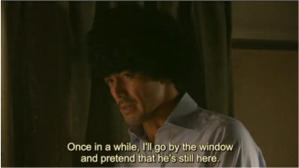
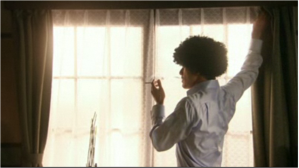
He reprises his Dragon Sakura/Trick roles (well, elements of the respective roles) with his madcap (election-planning) genius ways and his downright shamelessness. Or perhaps it shouldn’t accurately be called shamelessness because there are moments when it feels like he doesn’t even exist on the same mortal plane where there is a certain decorum to be observed.
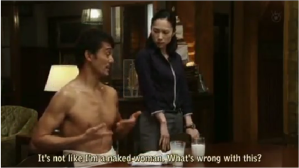
…Actually, perhaps “decorum” is too big a word. Something more…basic.
Anyway, if he sorta grated on my nerves in Dragon Zakura, I totally loved him here as one of Asakura Keita (Takuya Kimura)‘s loyal aides.
Secondly, Rosa Kato as Miyamoto Hikaru, another one of Asakura Keita’s sidekicks.
She’s just…completely adorable.
(Damn, couldn’t find a better picture –
Hikaru’s E-A-S-Y Lecture(?) On Politics
Hikaru gently explains the incomprehensible political jargon used in the drama! Please also participate in our quiz on “the Basics of Politics” and our -SOMETHINGSOMETHING- survey!
…Is what I think it says.)
I had my (rather serious) doubts about the boyish Takuya Kimura (how da heck does he keep so well anyway!) playing Prime Minister of Japan but he definitely proved me wrong in this drama. (And he did also take home the Best Actor Award at the 57th Television Drama Academy Awards for his role in CHANGE, so.)
I mean I think it’s obvious he does “idealist”, “respectful”, “humble” and “adolescent awkwardness” really well. And he doesn’t disappoint…
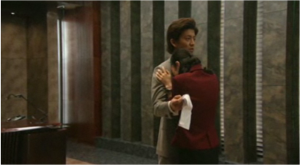
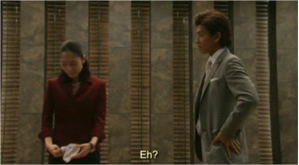
(HAHA FAVOURITE, FAVOURITE SCENE…of the relationship between Asakura and his secretary anyway. And I know how that Monica Lewinsky that sounds. But I swear, its a totally cute, totally awesome relationship you’d totally root for. And precious few JDramas successfully handle love stories, actually…)
But I honestly didn’t think he’d have sufficient…gravitas to be able to pull off particularly powerful or stirring speeches – but he did. And in the final few episodes (you will, specifically, remember his final speech in the tenth), did actually, almost move me to tears. I have gained fresh respect for Takuya Kimura and can see how the hype is justified now. (Not that I didn’t like him before!)
But you know who stole the show? I’m going to do the unorthodox thing and vote for the villain. No, because I think Terao Akira completely deserves it.
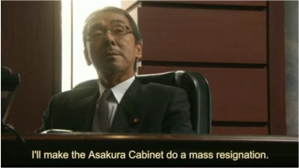

Seriously though, he has such…I can’t think of a just word…profound eyes!There is derision and contempt and yet a certain balefulness and a certain fatigue, presumably from his years messing around with politics.
Ah how do I love him (or at least, his understated performance), let me count the ways!
I’d say his languid hauteur if that didn’t smack of feminity, so instead…his easy arrogance and the leisurely calm, if not derisive amusement with which he watched his malicious conspiracies unfold. It made his ways all the more chilling, all the more bloodless, made him all the more villainous and menacing. And I’d say most of all, it is the unassertive presumptuousness with which he snaked his way about – the way he exuded a sense of…entitlement to the prime minister’s seat already that upped the eeriness of his role. He played the consummate politician, all poise and composure, the rightful prime minister trying to regain a seat that was but being temporarily warmed by some amateur rookie. Chilling, I tell you.
IN CONCLUSION
As Jane Austen once succinctly put it in Northanger Abbey, “From politics, it was an easy step to silence.”
(Okay no, that quote isn’t particularly…literary or brilliant. But it’s been sticking around in my head like a spat-out wad of chewing gum to the sneaker. Anyway, this is digressing.)
CHANGE does a remarkable job in handling its tricky theme. No, it isn’t perfect – and don’t stick around if you are looking out for any particularly incisive or enlightening insights into the world of Politics. There is some ridiculous over-simplification of difficult concepts here that almost insults any Government today. But it is a drama in the truest sense of the word – it will leave you sleepless and at moments, breathless with a compelling plot and an even more compelling cast. And the moments that are so hard to buy? At least, you want to believe – and how much more can you ask for a drama, than to have it make you want to believe.
QUALITY: 9/10
LOVEABILITY: 10/10